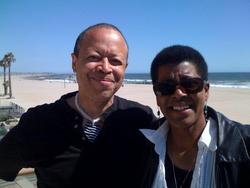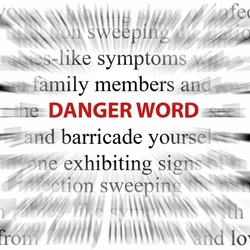 Authors Steven Barnes and Tananarive Due Tananarive Due (tuh-NAN-uh-reev DOO) is an American Book Award-winning author and the author, co-author and editor of over 15 books. She is the Cosby Chair in the Humanities at Spelman College in Atlanta, Georgia and currently, she and her husband, award winning science fiction writer, Steven Barnes, are producing a film based on their co-authored book, Devil’s Wake.  Short film based on the novel DEVIL'S WAKE. Thank you for agreeing to do this interview. I have made it no secret to my friends, family and strangers that you are one of my favorite writers, so I appreciate the opportunity to ask you a few questions. You’ve said in other interviews that you wanted to be a writer from the age of four. At what point did you make the decision that you wanted to write science fiction? I have written a bit of science fiction, but I see myself more as a dark fantasy or supernatural suspense (horror) writer rather than a science fiction writer. They are all in the family of speculative fiction; however, I remember being drawn to stories of space exploration and talking cats when I was a very young writer in elementary school. All children imagine stories of the fantastic, but it was hard for me to let them go when it was time to be a “grown-up” writer and take workshop courses at Northwestern University. My storytelling in the mimetic universe was very stale compared to my stories of the fantastic. For some reason, I become more deeply engaged in stories that are examining reality through the lens of metaphor. If we had the opportunity to eavesdrop on your writing process, what would it look like? What are your rituals and practices for creating your great stories? The most important element, perhaps, is music. I don’t always remember to listen to music when I need to write, but especially with a longer project like a novel or screenplay, nothing plunges me into “flow” state faster than a writing soundtrack. I create a specific soundtrack for almost every long piece of fiction I write. When I wrote Joplin’s Ghost, I listened obsessively to Joplin’s ragtime. When I wrote My Soul to Keep, I listened to a lot of early Louis Armstrong and world music. For post-apocalyptic zombie series, I prefer classic horror movie themes and epic, frightening themes and driving beats from musicians like Nine Inch Nails. Every long writing project has a music story behind it. It can be especially painful with screenplays, since I have yet to have a feature produced, so if I happen to hear a song from the soundtrack later, I might feel fresh disappointment. In what way has teaching writing to others helped or hindered your own writing? Aside from most writers’ innate desire to help pass on the lessons that helped them develop into professionals themselves, I find that hearing my own philosophies reinforced in a classroom situation can often translate to better habits in my writing life. I’m currently the Cosby Chair in the Humanities at Spelman College which has been a blessing. I wanted to take some time to breathe and concentrate on the work I have neglected. I found it difficult to spend time writing screenplays because of the financial pressure on my writing to create income, so I have been concentrating more on screenwriting and even filmmaking. That has been the big surprise to come out of teaching. I am also shifting more toward short fiction, exercising muscles that don’t get used in the same way in the world of a novel. In some ways, teaching has enabled me to feel like a student again. It isn’t easy balancing career and family, but you and your husband, Steven Barnes, seem to have found a method for making it work. What advice would you give others who want to be successful writers but don’t necessarily “see” how they can balance everything? I love being married to another writer, but I have learned that it’s very challenging to balance just the financial side in a two-artist home. Teaching has created more stability in our lives, and Steve has developed a great line of self-help and writing courses he sells online at www.diamondhour.com. So there’s that piece, and that’s a major piece—sources of income outside of the art. Raising a young son is another challenge, with serious time demands. All parents have to strike that balance of nurturing the marriage, nurturing the children and nurturing their careers…and perhaps writers have to also try a bit harder not to let their eyes glaze over in a faraway land while their children are present. “Balance” is a series of course corrections, much more a journey than a destination. And at the core of that is the nurturing of self—diet, exercise, meditation—that often gets forgotten. I was recently at a women’s empowerment luncheon in Atlanta, and a speaker made a great point that we can’t forget to nurture our girlfriends too because they are there to help us navigate the more difficult times. That’s why it’s an unexpected thrill to find myself working with both my husband and best friend on a short film, since it’s a project in common that gives us plenty of excuses to exchange ideas and talk to each other. You and Steven Barnes have collaborated on numerous novels (the award-winning Tennyson Hardwick mystery series and now Devil’s Wake and its sequel, Domino Falls), and you have said that the two of you have developed a writing strategy that involves one of you writing the first draft rather than you writing collectively. How did the two of you decide to adopt that practice for co-writing? Having worked in Hollywood and co-authored novels with science fiction greats Larry Niven and Jerry Pournelle, Steve has been a collaborator for much of his career. I was new to collaboration. I never would have conceived of a process where two writers are virtually side-by-side as they work, and Steve introduced his collaborative practices with other novelists to ours. I take first draft in the Tennyson Hardwick series we write in collaboration with Blair Underwood; Steve takes the first draft in our YA zombie series, which is a blend of science fiction and horror. Another rule Steve taught me: someone always has to have the final say, and generally it’s the writer who takes lead on the first draft. In an interview with Lit Stack, you mention that Devil’s Wake was born out of a short story you wrote with Barnes. Do you have any other works that started out as short fiction but evolved into a longer work? Actually, yes—my second novel, My Soul to Keep, evolved from both a poem I wrote in high school called “The Eternal Man” and a short story I wrote later called “The Anniversary,” about a woman whose husband leaves her without explanation after ten years—but he has never aged, never gotten sick. Recently you announced you and Barnes would be working with director Luchina Fisher to produce a short horror film, Danger Word, based on the novel Devil’s Wake. Why did you and Barnes decide to take on this huge undertaking without the financial backing of anyone other than yourselves, friends, family and fans? I could write a dissertation on why we’re co-producing Danger Word, but I’ll distill it to the practical: I’ve had film inquiries about my novels since my first book was published in 1995, Steve and I have sold three drafts of a screenplay to a studio, and we have both had works fall in and out of option. The bottom line is, we want to live to see our work produced. I know too many writers, including Octavia Butler, who never lived to see it—and we both love film, so it’s an important milestone to us. Beyond that, I want to be an example to other writers, actors or would-be producers who are sitting on the fence and believe it’s too difficult to be a filmmaker. So many artists opened my eyes to the possibilities in independent and short films--Ava DuVernay (I Will Follow, Middle of Nowhere) and emerging artists like Bree Newsome (Wake) and Keith Josef Adkins (The Abandon—a web series pilot). And I can’t forget the influence of Luchina’s short film in 2011, Death in the Family, which also truly inspired me. Once you see a string of others walking across the tightrope, you believe you might be able to walk up there too. Lastly, I know the impact of film and television. I remember watching Diahann Carroll as “Julia” and being fascinated by her son, Corey, who might have been the first black child I saw on TV. I remember how special it was when my family gathered to watch The Cosby Show, and how breathtaking Star Wars was. Those images are important nutrients. Danger Word is a zombie film on the surface, but I look forward to creating a visual blueprint that will help teach our girls to be strong. If readers would like to support the making of Danger Word, what can they do? What are some of the incentives for donating (other than supporting an amazing short film)? Our first fundraising deadline is May 25, when our projected shoot begins, so it’s a huge help just to pass the word and subscribe to our website: www.dangerwordfilm.com. We also have a Facebook page and a Twitter page: @ZombiesFreak on Twitter. But the bottom line is, we have a little over $5,100, and our production goal is $15,000. That’s a long way yet to climb. We’ve learned a great deal after observing Kickstarter and Indiegogo campaigns, and as a donor to other projects, I know how important it is for donors to feel recognized. We offer social media shout-outs, website listings, T-shirts, digital downloads, DVDs, a chance to be a zombie—all the way to a genuine producer credit on IMDb.com. Thank you Tananarive Due. Good luck with the film and all of your upcoming ventures. Thank you!
0 Comments
|
Archives
March 2021
Categories
All
Blog Roll
|
 RSS Feed
RSS Feed







